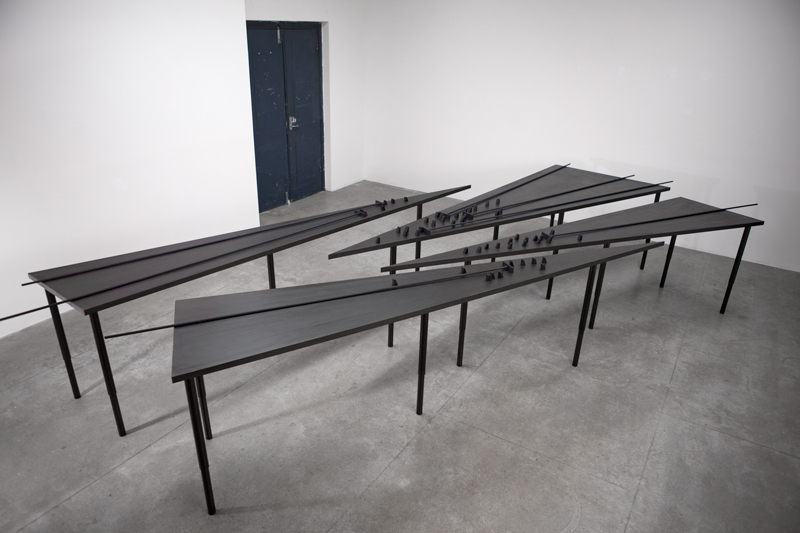Curating Feminism
Sydney College of the Arts Gallery, University of Sydney
23 October – 7 November 2014
exhibition, masterclasses, conference and Wikithon
Curators: artists
Co-ordinating Curator: Jacqueline Millner
Kelly Doley (Syd): Hissy Fit
Elvis Richardson/Virginia Fraser (Melb): The Countess Project
Laura Castagnini (Melb/London): Alice Lang
Jo Holder (Syd): Euraba Papermakers
Brigid Noone (Adelaide): Soda_Jerk
Jacqueline Millner (Syd): Philipa Veitch
Jo Holder (Syd)/Alana Hunt (Warmun): Shirley Purdie, Alana Hunt and others
 |
 |
 |
| Philipa Veitch, Force Multiplier, MDF, aluminium, pine, black japan wood stain, paint, dimensions variable, 2014 |
Force Multiplier
The term Feminism bears the weight of often diametrically opposed meanings and connotations, symbolizing empowerment, liberation and equality to some, while for others it is used as a label with which to belittle, vilify or marginalize those who choose to espouse its values or carry its name. Charged with affect, laden with associations and references, and often dismissed as passé or devoid of relevance, the use and misuse of the term Feminism continues to provoke, enrage and inspire. Force Multiplier explores the role of Feminism as an instrument of radical critique and social and political empowerment. As democratic norms appear to wither, and violence, political brinkmanship and internecine conflict continue to escalate, we bear witness to the birth of a new geo-political landscape where the hard lines that defined the boundaries of nation-states, ethno-religious groups and corporate entities have in many parts of the world begun to blur, and their objectives merge. In this state of violent flux in which one crises merges into the next, the historical and contemporary critiques of Feminism come into sharper relief. This atomised hypermatrix – a vision of the world, an artifact seen arguably most objectively through the prism of contemporary art – is the new realism.
A force multiplier is a military term that refers to a factor or capability that can significantly increase the effectiveness and therefore the likelihood of success of a particular campaign or group. Popularized by Colin Powell’s catchphrase “Optimism is a force multiplier”, the term is now encountered most frequently within the business community to describe the way that marketing, technology and other business tools can be employed to dramatically increase a company’s market share and profitability. Used somewhat simplistically, a force multiplier is generally considered to be a form of technology, or an advancement in a form of technology that confers a purely quantitative advantage to a group’s operational capabilities.
Yet since the late 19th and early 20th centuries, artists associated with the avant-garde and the divergent strands of Modernism, post-modernism and contemporary art have attempted to advance radical forms of thinking and practice that would serve as both a critique of current modes of social organization and artistic representation, and more importantly act as a catalyst for more progressive models of acting, being and creating. The most successful artworks are those that perform what cultural theorist Slavoj Žižek has called a critical “short circuit”, exposing the tensions within or between a particular subject or field of inquiry, while simultaneously making explicit the conditions and operations of their own production. Simply put, within the arena of modern and contemporary art production, these forms of material thinking act as a form of qualitative force multiplier, the most effective examples catalyzing novel forms of thought and production that dramatically alter our view of the existing world order and of what art is and can be.
The work of Feminists and Feminist art practitioners has both through choice and necessity continually acted as a critical short circuit within all of the fields of endeavour with which it has been associated, and moreover, has yet to be neutered through total assimilation or commodification by the artworld or mainstream culture. Taking the form of a de-constructed military plotting table, Force Multiplier considers the power of Feminist thinking within the field of contemporary art and curatorial practice, and its role in re-imagining and re-shaping a world in a state of perpetual crisis.

